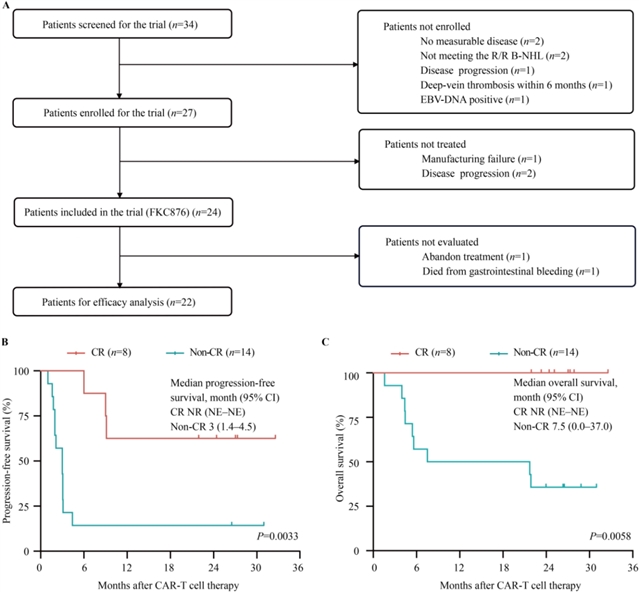|
|
|
|
|
FMD 论文速览:抗CD19嵌合抗原受体T细胞疗法中,免疫抑制性肿瘤微环境加剧弥漫大B细胞淋巴瘤进展 |
|
|
论文标题:Immunosuppressive tumor microenvironment contributes to tumor progression in diffuse large B-cell lymphoma upon anti-CD19 chimeric antigen receptor T therapy
期刊: Frontiers of Medicine
作者:Zixun Yan, Li Li, Di Fu, Wen Wu, Niu Qiao, Yaohui Huang, Lu Jiang, Depei Wu, Yu Hu, Huilai Zhang, Pengpeng Xu, Shu Cheng, Li Wang, Sahin Lacin, Muharrem Muftuoglu, Weili Zhao
发表时间: 15 Aug 2023
DOI:10.1007/s11684-022-0972-8
微信链接:点击此处阅读微信文章
导 读
上海交通大学医学院附属瑞金医院赵维莅等在Frontiers of Medicine发表研究论文《抗CD19嵌合抗原受体T细胞疗法中,免疫抑制性肿瘤微环境加剧弥漫大B细胞淋巴瘤进展》(Immunosuppressive tumor microenvironment contributes to tumor progression in diffuse large B-cell lymphoma upon anti-CD19 chimeric antigen receptor T therapy)。本研究通过单细胞RNA测序分析发现,弥漫大B细胞淋巴瘤患者接受抗CD19嵌合抗原受体T细胞(CAR-T)治疗时,肿瘤微环境中M2亚型巨噬细胞可通过增殖能力、代谢异常及抑制CAR-T细胞的细胞毒性,导致免疫抑制微环境持续存在并加剧疾病的进展。
Anti-CD19 chimeric antigen receptor (CAR)-T cell therapy has achieved 40%–50% long-term complete response in relapsed or refractory diffuse large B-cell lymphoma (DLBCL) patients. However, the underlying mechanism of alterations in the tumor microenvironments resulting in CAR-T cell therapy failure needs further investigation. A multi-center phase I/II trial of anti-CD19 CD28z CAR-T (FKC876, ChiCTR1800019661) was conducted. Among 22 evaluable DLBCL patients, seven achieved complete remission, 10 experienced partial remissions, while four had stable disease by day 29. Single-cell RNA sequencing results were obtained from core needle biopsy tumor samples collected from long-term complete remission and early-progressed patients, and compared at different stages of treatment. M2-subtype macrophages were significantly involved in both in vivo and in vitro anti-tumor functions of CAR-T cells, leading to CAR-T cell therapy failure and disease progression in DLBCL. Immunosuppressive tumor microenvironments persisted before CAR-T cell therapy, during both cell expansion and disease progression, which could not be altered by infiltrating CAR-T cells. Aberrant metabolism profile of M2-subtype macrophages and those of dysfunctional T cells also contributed to the immunosuppressive tumor microenvironments. Thus, our findings provided a clinical rationale for targeting tumor microenvironments and reprogramming immune cell metabolism as effective therapeutic strategies to prevent lymphoma relapse in future designs of CAR-T cell therapy.
抗CD19嵌合抗原受体(CAR)-T细胞疗法在复发或难治性弥漫性大B细胞淋巴瘤(DLBCL)患者中实现了40%–50%的长期完全缓解,但肿瘤微环境变化导致CAR-T细胞疗法失败的潜在机制仍需深入探索。一项抗CD19 CD28z CAR-T的多中心I/II期临床试验(FKC876,注册号ChiCTR1800019661)显示,在22例可评估的DLBCL患者中,7例实现了完全缓解,10例出现部分缓解,4例在第29天病情稳定。从长期完全缓解和早期病情进展的患者中采集核心针活检肿瘤样本,获取单细胞RNA测序结果,并在治疗的不同阶段进行比较发现,M2亚型巨噬细胞在体内外均显著抑制CAR-T细胞的抗肿瘤功能,导致DLBCL中CAR-T细胞疗法的失败及疾病进展。免疫抑制性肿瘤微环境在CAR-T治疗前、细胞扩增期及疾病进展期持续存在,且浸润的CAR-T细胞无法逆转此状态。M2亚型巨噬细胞的异常代谢特征及功能失调T细胞的代谢紊乱进一步加剧了免疫抑制微环境。本研究为未来CAR-T疗法设计中联合靶向肿瘤微环境及重编程免疫细胞代谢以预防淋巴瘤复发提供了临床依据。

期刊介绍
Frontiers of Medicine专注于发表临床医学和基础医学领域的最新研究成果,旨在通过全球医疗专业人员之间的交流促进健康和医疗保健的发展。该刊采用严格的同行评审和编辑流程,确保发表的文章的科学准确性、新颖性和重要性。
原文信息
标题
Immunosuppressive tumor microenvironment contributes to tumor progression in diffuse large B-cell lymphoma upon anti-CD19 chimeric antigen receptor T therapy
作者
Zixun Yan1, Li Li1,5, Di Fu1, Wen Wu1, Niu Qiao1, Yaohui Huang1, Lu Jiang1, Depei Wu2, Yu Hu3, Huilai Zhang4, Pengpeng Xu1, Shu Cheng1, Li Wang1, Sahin Lacin5, Muharrem Muftuoglu5, Weili Zhao1,6
机构
1. Shanghai Institute of Hematology, State Key Laboratory of Medical Genomics, National Research Center for Translational Medicine at Shanghai, Ruijin Hospital Affiliated to Shanghai Jiao Tong University School of Medicine, Shanghai 200025, China
2. Institute of Hematology, The First Affiliated Hospital of Soochow University, Suzhou 215000, China
3. Institute of Hematology, Union Hospital, Tongji Medical College, Huazhong University of Science and Technology, Wuhan 430000, China
4. Tianjin Medical University Cancer Institute & Hospital, Tianjin 300070, China
5. University of Texas MD Anderson Cancer Center, Houston, Texas 77030, USA
6. Pôle de Recherches Sino-Français en Science du Vivant et Génomique, Laboratory of Molecular Pathology, Shanghai 200025, China
通讯作者
Weili Zhao
引用这篇文章
Zixun Yan, Li Li, Di Fu, Wen Wu, Niu Qiao, Yaohui Huang, Lu Jiang, Depei Wu, Yu Hu, Huilai Zhang, Pengpeng Xu, Shu Cheng, Li Wang, Sahin Lacin, Muharrem Muftuoglu, Weili Zhao. Immunosuppressive tumor microenvironment contributes to tumor progression in diffuse large B-cell lymphoma upon anti-CD19 chimeric antigen receptor T therapy. Front. Med., 2023, 17(4): 699–713
https://doi.org/10.1007/s11684-022-0972-8
https://journal.hep.com.cn/fmd/EN/10.1007/s11684-022-0972-8
https://link.springer.com/article/10.1007/s11684-022-0972-8
感谢作者对Frontiers of Medicine的信任和支持。

《前沿》系列英文学术期刊
由教育部主管、高等教育出版社主办的《前沿》(Frontiers)系列英文学术期刊,于2006年正式创刊,以网络版和印刷版向全球发行。系列期刊包括基础科学、生命科学、工程技术和人文社会科学四个主题,是我国覆盖学科最广泛的英文学术期刊群,其中12种被SCI收录,其他也被A&HCI、Ei、MEDLINE或相应学科国际权威检索系统收录,具有一定的国际学术影响力。系列期刊采用在线优先出版方式,保证文章以最快速度发表。
中国学术前沿期刊网
http://journal.hep.com.cn

特别声明:本文转载仅仅是出于传播信息的需要,并不意味着代表本网站观点或证实其内容的真实性;如其他媒体、网站或个人从本网站转载使用,须保留本网站注明的“来源”,并自负版权等法律责任;作者如果不希望被转载或者联系转载稿费等事宜,请与我们接洽。